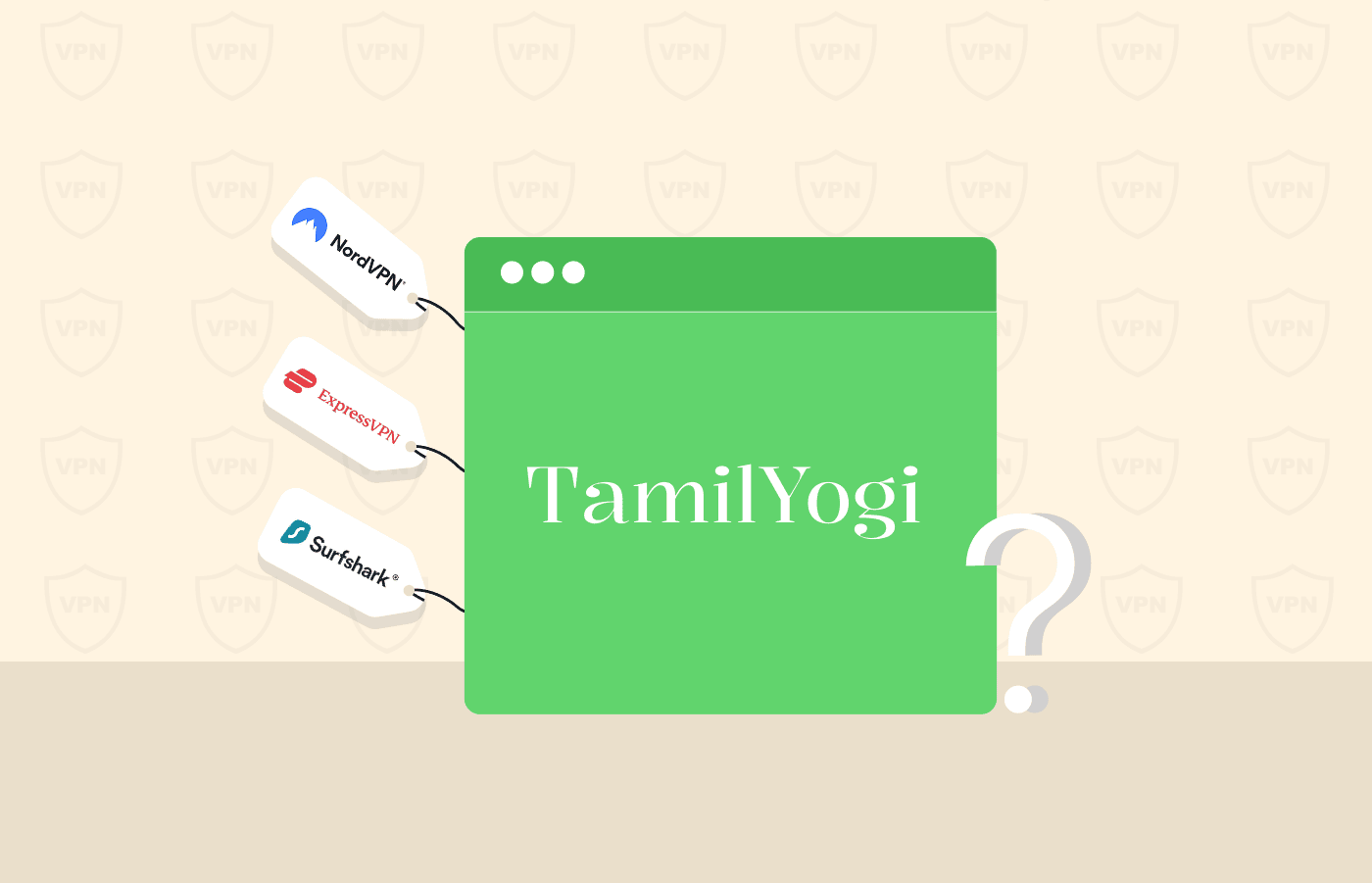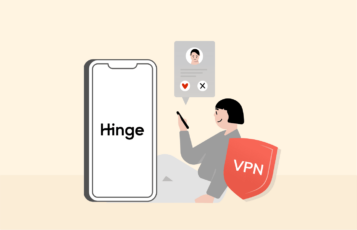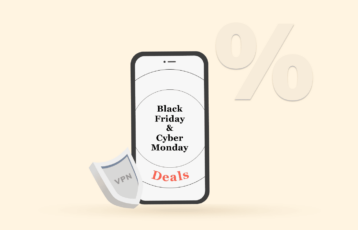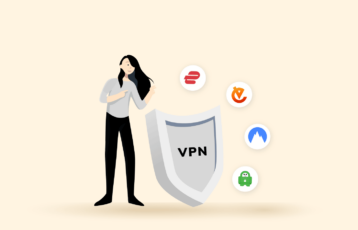Today, everyone has a bank account and a relevant banking branch nearby. Yet, most people try hard to spend as little time at banks as possible because it’s never a great experience. That’s why ATMs appeared first, followed by quick digital banking – thanks to the rapid internet revolution. Nonetheless, this banking evolution brings its own security risks, thus triggering the need to use a VPN for online banking.
But what are those risks? Where to find the best banking VPN? If that’s what you are tensed about, don’t worry. This article highlights all those details alongside listing the top banking VPN apps you can use today.
Top 5 Internet banking VPNs – Quick list
If you want to ensure your safety and protect your interactions with your bank, you need a VPN service. There’s no way around that. If you are already sold on the idea and more or less conversant with the VPN world, here’s the gist of our findings. However, those readers looking for more in-depth information can find it in the following sections.
Here are the best bank account VPNs.
- NordVPN: A top-notch VPN for almost every task out there is also great for banking.
- Private Internet Access (PIA): A privacy champion with a track record supported by court cases.
- ExpressVPN: The most significant reputation in the VPN-verse also delivers the goods for this task.
- Surfshark: A budget-friendly option that will give you almost the same perks like the best VPNs.
- CyberGhost: The friendliest options for VPN rookies.
Why do you need a VPN for safe online banking?
With the increasing online risks, taking steps to protect yourself from various online threats is essential. Falling victim to cyber threats can have devastating outcomes, such as losing savings and identity theft. In online banking theft, cyber criminals’ most common methods to access your bank accounts include phishing scams, spoofing, and man-in-the-middle attacks.
Of course, most banks have done their best to boost their online security measures. We’ve seen the integration of 2FA verification options, such as one-time passwords and authenticator apps, into their systems. However, these options alone are not a means to an end to protecting your online banking. You still need to go an extra step using a VPN to improve your security and privacy. A VPN protects your online banking by doing the following:
- Securing your internet connection: A VPN transmits your internet connection through an encrypted tunnel. Public Wi-Fi is often unsecured and vulnerable, which puts your private information in great danger. However, a VPN creates a secure tunnel for your sensitive data to pass through, thus protecting it from attackers and eavesdroppers.
- Anonymize your online activity: VPNs ensure they anonymize your online activity by hiding your IP address by tunneling your network through various servers. A concealed IP address makes it challenging for cybercriminals to track your activity. Anonymity is essential when accessing your online banking services as it prevents third parties from intercepting your login details and other credentials.
- Encrypt your internet traffic: When using a VPN, all the data transmitted to ISPs and websites is encrypted. This adds a layer of protection, thus protecting your sensitive information, such as credit card information and login details, from baddoers.
- Provide extra security features: Reliable VPNs offer additional security features such as double encryption, a kill switch, malware blockers, and no logs policy. These features boost your overall online security.
- Geo-blocking restrictions: If you’re traveling to a foreign country, accessing your bank account can be difficult due to geographic restrictions. You can connect to a server in your home country using a VPN and access your bank account as if you were still there. VPNs improve convenience and allow you to always stay on top of your finances.
Using a VPN to access online banking services is a good practice to protect sensitive information from cyber threats. However, ensure you choose a reputable VPN provider, follow best practices for online security, and regularly monitor your bank accounts for any suspicious activity.
5 best VPNs for banking in 2025 – Detailed list
Now that you know how a VPN protects your digital banking, let’s move on to the best VPNs for bank transactions.
But before we advise you, let us remind you about some basic security facts.
A VPN is probably the essential tool to secure your digital experience. But it’s not the only thing you need; it doesn’t do everything. There is no silver bullet in the digital security world. It would be best to have a good antivirus suite and a password manager. Otherwise, the security holes your VPN fixes still leave other holes around your system that an intruder could exploit to harm you. Digital security is always about the integral approach.
So now, let’s go ahead and talk about the best five VPNs you could consider using to have a safe digital banking life.
1. NordVPN

The number 1 VPN for sensitive online activities. It’s stealth servers, strong privacy, resilient security, and fast-speeds make it the best VPN for online banking.
Pros
- Fast speed servers
- Huge network with multiple locations
- Robust privacy features
- Supports all major desktop, mobile, routers, and other smart devices
Cons
- Detailed settings in the desktop app may be overwhelming
After thorough testing for various tasks, NordVPN appears excellent in every possible way. It secures your banking activities and gives you many extra features to enhance your digital experience.
NordVPN is reliable and secure, and it keeps no logs at all. So it’s an excellent option for banking.
This vendor will also get you CyberSec (an ad blocker preventing malicious code and trackers), DoubleVPN servers (to add extra encryption layers), and Onion over VPN (supports browsing with Tor on your VPN). Moreover, it has DNS leak protection, a kill switch, supports smooth video streaming and gaming, and offers a dedicated IP.
Very few products or services live up to their advertising. However, NordVPN does it, and it’s also priced at very reasonable rates.
NordVPN is our preferred VPN for almost any task that comes across us. You can’t go wrong by choosing this VPN, and it will do so much to improve your digital life in other ways that you’ll soon be asking yourself why you did not hire it earlier.
2. Private Internet Access (PIA)

With huge server network, PIA VPN never fails to give you a working IP address to perform online banking just as you did in your home country.
Pros
- One of the largest server network
- Ensures secure browsing
- Compatible with various devices
Cons
- Based in US (a 5-Eyes country)
Private Internet Access (PIA) is a VPN that honors its name. Let us explain why.
Security, anonymity, and privacy are intimately related but fundamentally different. Security and anonymity are all about technology. You’re there if you choose the suitable device and software for security and anonymity. It’s automatic, and it works once the technology is set. Privacy is a different thing altogether. It needs technological tools for implementation but, at the core, is a human decision. It’s all about policy.
Encryption and IP spoofing in VPNs will give you security and anonymity but not privacy. Privacy needs for your provider to be committed to a strict no-logs policy. It means that it doesn’t collect any data on you or any other user in the network. The thing is that a VPN server allows for configurations in which it will collect information on everything you do or one in which it never saves any such data. And that’s the difference.
Every VPN on our list has a no-logs policy, and we’re sure they honor it as far as we can tell. However, PIA has had to face the music. The government requested the company’s logs in two legal trials in 2015 and 2017. PIA delivered nothing. It was not because of any rebellious streak but because it had no records stored it could give away. This is how you can ensure your privacy is safe with PIA.
And it has many other advantages besides. For example, PIA’s server network is among the most prominent businesses, with nearly thirty thousand nodes in over eighty countries.
PIA’s speeds are good, but there is nothing to write home about. However, this is not a problem for banking because it’s not the type of use case you need to have a lot of bandwidth. Online banking rarely involves downloading files; when it does, they’re small. The transfers mainly involve text, so even a slow connection is good enough for you to have a smooth banking experience.
Additional features include having a dedicated IP (so you will get the same IP address every time you use a given server), an ad-blocker, and excellent apps and clients.
Transparency in PIA is unmatched in the industry. Every app is an open-source project. So, the code is available for anybody to examine and audit, which keeps the VPN’s software current and secure.
3. ExpressVPN

Known for speed and reliability, ExpressVPN is the perfect choice for online banking, online payments, and sharing sensitive data without fearing snoopers.
Pros
- Blazing fast speed
- Unblocks streaming sites and other restricted content
- Tremendous cross-platform compatibility
- Robust security and privacy features
Cons
- Relatively costly
ExpressVPN has a network of fast and reliable servers globally. In addition, it offers state-of-the-art security protocols with military-grade encryption. It also includes additional security features such as a kill switch. Moreover, it’s good enough to support smooth video streaming.
This provider has been playing the VPN game at the highest level for a long time, acquiring the best reputation. As a result, it’s an excellent option regardless of the task you want to protect with your VPN. Fortunately, it seems to be especially well-suited for banking.
ExpressVPN encrypts traffic with the AES-256 algorithm, the industry standard in VPNs, the intelligence community, the military, and the banking system.
But if the bank’s app already uses AES-256 to protect online interactions, why use a VPN, we hear you ask?
The protection your bank’s app provides starts only after you log into its system. External observers can trace everything you do before and after, thus making you vulnerable to external attacks. On the other hand, if you’re on a VPN, you’re protected all the time, not just when you’re within your bank’s system.
ExpressVPN has a no-log-keeping policy, which shows how it cares about your privacy. Nothing you do while you’re online through your VPN gets recorded.
The excellent service in ExpressVPN comes at a price. Perhaps this provider’s only drawback is its monthly fee, which is above the market’s average. However, a better service should always cost more. So, this doesn’t have to be a deal-breaker for the most informed potential users. Other options in our list offer services close to ExpressVPNs at lower prices.
4. Surfshark

A budget-friendly privacy tool to protect your financial details, transactions, and other online activities.
Pros
- User-friendly apps
- Tremendous cross-platform compatibility, including routers
- Supports streaming, torrenting, and gaming alike
- Affordable pricing plans
Cons
- Inconsistent performance with distant servers
Surfshark doesn’t have ExpressVPN’s long history. Instead, it’s a relative newcomer to the VPN world. Still, it’s made a difference in the industry by offering a top-notch service that compares well with Nord or Express but costs a fraction of the price.
It is one of the most versatile VPNs. Surfshark performs regardless of the task you throw at it, and online banking is no exception. Encryption is AES-256; it has a kill switch and fast and reliable connection speeds. Besides the standard VPN requirements, it will also give you several additional features that significantly enhance your digital experience.
Furthermore, it offers a widespread network with over three thousand servers in sixty countries. Also, this network allows unlimited devices to be online concurrently instead of the usual 5-8 connections that most vendors allow.
Surfshark can obfuscate your traffic to bypass even the tightest censorship measures. And yes, this is one of the few VPNs that work in China, which is no mean feat.
New VPN users often insist on using free VPNs despite their strict security and privacy problems. For them, Surfshark is the vendor that fits into any budget. At less than three USD monthly, there’s no reason for anybody not to have an excellent, safe, private VPN.
Surfshark is the most cost-effective VPN on our list, but don’t let the low price fool you. It’s as reliable and advanced as the best in the business and a great choice.
5. CyberGhost

This user-friendly VPN works great to unblock streaming, make secure online payments, and spoof IP addresses globally.
Pros
- Good for beginners due to user-friendly apps
- Offers limited free trial
- Affordable cost
Cons
- Speeds not good for gaming
If you don’t know VPN tunneling protocols, don’t understand split tunneling or specialized servers, or don’t care about these details, no worries. You might only want a VPN installed on your device, which works well without your input. Fair enough! CyberGhost is the VPN for you!
CyberGhost is a high-quality VPN service tailored to be a beginner-friendly VPN. The user interface is extraordinary, and the navigation is very intuitive. Suppose this article has persuaded you about securing your digital banking operations with a VPN, but you don’t want any technical complications. In that case, the Romanian CyberGhost VPN is the way to go for you.
The server network is extensive, with thousands of servers in more than 90 countries, standard unbreakable encryption, seven simultaneous connections allowed, and many customization options for those who want it.
But do not let simplicity deceive you; it is one of the best VPNs in the market. Also, it’s almost as affordable as Surfshark; it’s advanced and reliable.
You won’t go wrong if you choose CyberGhost for usability or any other reason.
How to choose the right VPN for online banking?
The five options described above are hand-picked by our expert staff. However, choosing the right VPN to meet a specific goal is difficult.
First, you must know what a given task needs in technical terms. Then, you need to invest a lot of time, resources, expertise, and energy, putting several options to the test to identify those that will succeed above the rest.
We have done the work for you to save you from all the hassle. Yet, for transparency, we will tell you how we picked our top entries.
Everything starts with baseline security. Your digital banking credentials must remain safe at all times. Hence, every VPN in our list has AES 256-bit encryption and the best VPN tunneling protocols (which have been audited) to keep your information secure.
Then, we went for additional features. Remember, a VPN is supposed to encrypt your traffic and spoof your IP. So, as long as it performs both tasks correctly, it’s a good service.
However, our five picks will give you a lot more features. Most include kill switches, ad blockers, adding extra encryption layers, and more. These features do not protect your information exchanges with your bank directly. Instead, they create a safe environment in your computer or device so that you live within a digital fortress where indirect attacks can’t succeed against you. In that regard, the extra features are not optional. We want them in our best VPNs because they make everything safer.
Another thing you want is user-friendliness. Dealing with your bank can be already stressful enough. Your VPN should relieve some of that stress instead of adding to it.
Server location is also an important issue. For example, most banks will have a geo-block in place. As a result, only domestic internet users can log into the bank’s system. So, the VPN server network must include as many countries as possible so that you will always find an accessible server near you that will allow you to sign in to your bank.
Every entry in our top five VPNs for banking delivers the goods. They meet every requirement and do it in style, so you can be sure that all of them will significantly help your banking tasks.
Free VPNs and online banking: Could I use a free VPN instead?
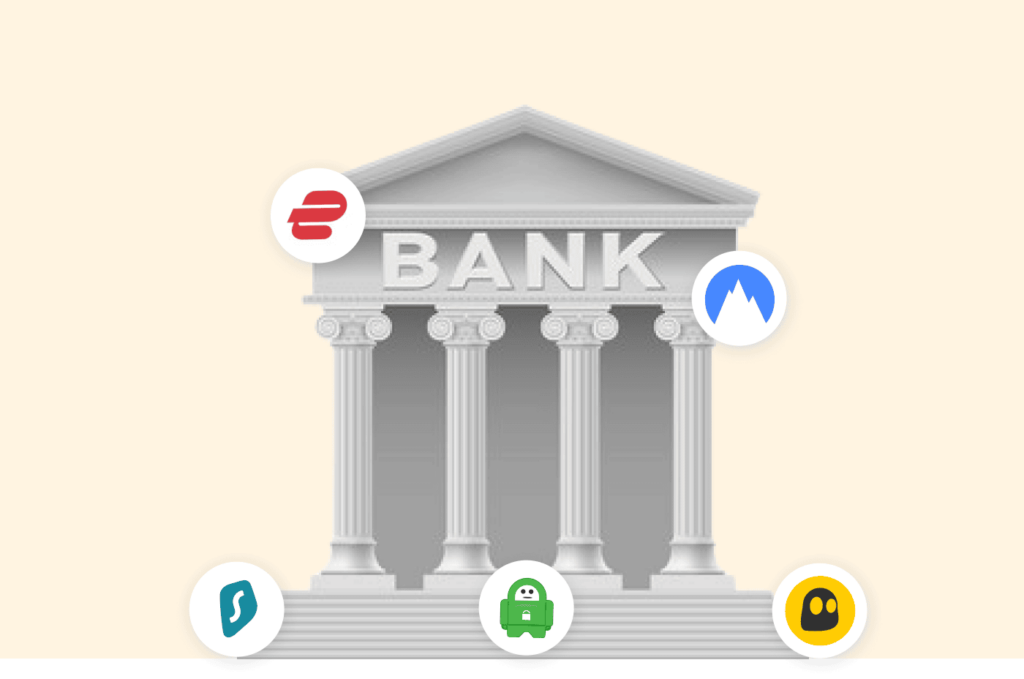
The short answer is: that you should never use a free VPN. And since banking online involves sensitive information, you should be especially careful to avoid free VPNs when banking is on your mind.
Free VPNs claim to be as good as their paid premium counterparts. However, many problems are associated with free VPNs, from lack of functionality to security issues.
Let’s start with the functionality problems. First, free VPNs have server networks with fewer servers. Because the demand for free VPNs is sadly very high, the small network size translates into overworked servers. You may need to wait for several minutes for a successful connection. And once the link is established, you could lose it anytime due to instability. It’s the last thing you want to happen as you complete a sensitive financial operation.
Free VPNs never have the resources you can find in premium VPNs. Bandwidths are low, the data is capped to a daily quota, the servers are too busy, and if you’re not in a privileged area, you could have difficulty finding a server that suits you.
However, you could tell us that online banking is not a resource-intensive task (like gaming or video streaming), so a VPN could still trick you even with all those limitations. That’s right, but there are other issues at stake. Keep reading.
Free VPNs are on business to turn a profit. However, since they get no revenue from your user fees, they get their money by ruining your privacy.
The most frequent business model in free VPNs consists of the VPN using its servers to keep detailed user logs. Then, those logs are sold to advertisers and other data miners who can squeeze helpful information from those logs.
So, a free VPN turns your privacy into a commodity they can sell to their commercial partners. While it is disturbing in any scenario, imagine this data on sale to third parties, including your banking credentials and financial activities. It brings “disturbing” to new, higher levels.
So, while the technical limitations in free VPNs may not be enough to avoid them (as they would be in other tasks such as video streaming), the privacy and security issues in free VPNs should be a huge red flag. If your normal digital activities need protection from snoopers, your online banking needs that protection and much more.
In the final analysis, a free VPN could save you the cost of a monthly subscription fee with a premium service. But it could cost you your whole banking account. So free VPNs are not worth the risk, especially when premium VPNs can fit into any budget.
Will VPN work with my bank?
VPN use should not be an issue, provided you adhere to their guidelines and precautions. Some banks flag VPN connections because cybercriminals mostly use them to commit fraud. However, banks have put measures and guidelines that customers must abide by if they’re using a VPN:
- Alert your bank if you travel abroad: Notifying your bank ensures they don’t flag your online banking activity as suspicious.
- Enable additional security measures such as 2FA: Enabling additional security features like 2FA authentication can provide an extra layer of protection to your banking transactions, regardless of whether or not you’re using a VPN.
- Be consistent with your server location: Banks unaware of your traveling plans treat foreign logins as suspicious activity. As such, ensuring that you consistently log in to a server in your home country minimizes the possibility of activity being flagged.
Access Bank of America with a VPN
Accessing Bank of America with the VPNs mentioned above can be challenging due to the bank’s strict security measures and limitations. While Bank of America recommends using VPNs to secure transactions on public networks, it also blocks specific VPN server IP addresses to prevent fraudulent activities.
If you encounter issues accessing Bank of America with your VPN, the VPN server you’re using has likely been blocklisted by the bank. However, you might avoid this by using a VPN with various US server networks. In this case, you can connect to a different server location and access Bank of America without issues.
And what else is a VPN going to do for me?
A VPN will do many great things to improve your digital life besides securing your online banking.
VPNs are the Swiss army knives of the digital age. They are potent and versatile tools that have many use cases. As a result, they can improve almost any activity you perform online.
So these are some other things that will improve with a VPN besides banking:
- Video streaming. A VPN will allow you to unblock many video streaming services worldwide.
- BitTorrent. If you like the BitTorrent experience, you will be better off hiding your IP address within this or any other P2P network.
- Downloading. Traffic obfuscation and other VPN tools prevent your ISP from throttling your account. So, you will always have 100% of your bandwidth available to do whatever you want.
- Shopping. A VPN allows you to buy your services and products from anywhere. Thus you can choose the lowest prices for the same things and save a lot of money.
Drawbacks to VPNs and online banking
Using a VPN for online banking brings various benefits, such as improved privacy, security, and anonymity. However, anything with benefits has its limitations. In this case, drawbacks to VPNs and online banking include the following:
Out-of-country access
When using a VPN to access your bank account from a different country, you may trigger fraud prevention systems that block your login attempts. Banks often monitor login activity and may flag logins from unfamiliar or suspicious locations.
This could result in your account being locked or frozen for security reasons. To avoid this, you must notify your bank of your travel plans to ensure they’re away from foreign login attempts.
Another alternative is to use a VPN server in your home country when possible. So, a VPN with a variety of server locations is desirable.
Banned VPNs
Some banks may block access to their online services from VPNs due to security concerns or to comply with regulatory requirements. In some cases, the bank may block specific VPN servers or IP addresses that are known to be associated with fraud or abuse.
If you encounter issues accessing your bank account with a VPN, you may need to switch to a different server or contact your bank’s customer support for assistance.
Additional tips to secure your online banking
Besides using VPNs to access your online banking, there are other tips to improve your online banking security:
- Verify that the bank’s URL starts with “HTTPS.”: Ensure the website you’re accessing starts with “HTTPS” instead of “HTTP” in the URL: The “s” indicates that the website uses encryption to protect your data, which makes it more difficult for cybercriminals to intercept and steal your private data. You can verify the website’s security by looking for a lock icon on the address bar’s left.
- Change your passwords often and use 2-factor authentication: Regularly changing and using a strong password is vital in keeping your account safe. Additionally, enabling 2-factor authentication (2FA) improves the security of your account by requiring a second form of verification to access your account.
- Monitor your accounts regularly for suspicious activity: Keep a close eye on your online banking activity and immediately report any unauthorized transactions to your bank. Most banks offer mobile apps or online tools that allow you to monitor your accounts in real-time and set up alerts for suspicious activity.
- Be wary of phishing scams: They trick you into revealing sensitive information, such as passwords and usernames. Always double-check the URL of any website you’re accessing, and avoid clicking on links or downloading attachments from unsolicited emails or messages.
- Update your antivirus and device software: Ensure that your antivirus software and device software are up-to-date. This will help protect your device from malware and other cyber threats that could compromise your online banking activities.
- Keep your devices safe: Always use a secure and trusted internet connection when accessing your online banking accounts. Avoid using public Wi-Fi networks or shared computers, as hackers can easily compromise them.
Additionally, ensure your device has a password or PIN code, and consider enabling biometric authentication such as fingerprint or facial recognition for improved security. Make it a habit to log out of your activity sessions after you use them.
FAQs
Some banks don’t like VPNs, for sure. For instance, US-based banks are notorious for this. But this is not the rule everywhere in the world. And a service like ExpressVPN, NordVPN, or Surfshark will successfully bypass a bank’s VPN ban.
